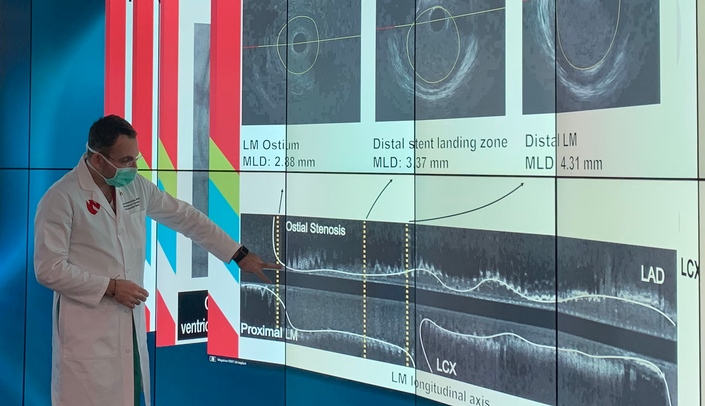The new supercomputer at the University of Nebraska Medical Center — considered the Ferrari of computing by some — enables UNMC researchers to rapidly and efficiently process huge amounts of data.
Reportedly the fastest computer in the state that also is HIPAA compliant, the DGX A100 supercomputer is part of the Center for Intelligent Health Care, a University of Nebraska Board of Regents-approved Center of Excellence housed at UNMC.
The center, approved in 2020, works across the NU system to unite clinicians, clinical informaticists, data scientists and computer scientists to make health care more efficient, effective and safer for patients.
"This is a superior system located on campus for research, imaging, AI (artificial intelligence) and deep learning," said Melissa Christian, CIHC manager. "This computer is a unifying, neutral piece of equipment that all academic researchers need to analyze big data: from the genome to population-based research. Algorithms optimized to the supercomputer speed up data collection and analysis. Its speed is phenomenal."
That’s important in creating predictive models that help identify diseases in advance. Said Christian: "Because the supercomputer is within the UNMC firewall and is HIPAA compliant, we can take thousands of data points, charts and clinical encounters from EPIC and other data sources and create predictive models of disease that the human eye can’t catch."
And that’s invaluable for health care providers who may see patients for decades yet be unable to predict early risk of disease because of subtle changes in symptoms. Using deep-machine learning, a subset of artificial intelligence, the supercomputer can use algorithms to predict disease risk early and then guide preventive treatments.
"It’s the ecosystem of big-data, computers, software and the expertise of personnel that helps build the Center for Intelligent Health Care – each of these components have little value without the ecosystem," said Babu Guda, PhD, assistant dean for research development in the UNMC College of Medicine.
That ecosystem got a boost with the purchase earlier this year of the DGX supercomputer, which researchers say is impressive in its speed, stability, reliability and compatibility with different software.
"The DGX supercomputer is great," said David Ellis, research/data analyst in neurosurgery, who has supercomputing experience with the University of Nebraska’s Holland Computing Center. "Its capabilities far exceed anything that we have had access to before, and it’s specifically designed to train deep learning models."
Ellis currently uses the DGX system to train deep learning models to process CT head images. The models automatically anonymize the images by quickly removing facial features. This anonymization protects patient privacy and allows the images to be shared for research and training purposes.
Yiannis Chatzizisis, MD, PhD, professor of internal medicine, and his research group of engineers and MDs, use the system to perform patient-specific computer simulations of coronary artery stenting procedures. These simulations, he said, are a faithful replica of the clinical procedures and can guide interventional cardiologists in decision-making and pre-procedural planning to improve clinical outcomes.
"The system can handle a large amount of data and run multiple tasks simultaneously," Dr. Chatzizisis said, noting that it now takes four hours to run a simulation, instead of the previous eight. Ultimately, he hopes to run simulations in near real-time.
Already, the center and supercomputer are helping create a new era of precision health care, CIHC leaders said.
How?
By delivering to clinicians the right information at the right time and in the right format. As John Windle, MD, director of the CIHC, said when the center was approved: "Linking human cognition and artificial intelligence with good data, and the right algorithms and analytics, will help us achieve that precision."
The CIHC team can review requests to use the supercomputer and help align researchers — whether from the other NU campuses or private entities — with the necessary IT expertise to create successful projects.
Acquisition and implementation of the supercomputer was made possible by UNMC's Research Information Technology Office (RITO). Ashok Mudgapalli, PhD, director of RITO, played a significant role in the planning and acquisition, while RITO’s senior technical staff architected the implementation and also administer the system’s daily operations.
RITO works closely with UNMC’s Information Technology Services and other college and departmental IT units to fulfill the specialized IT needs of the medical center’s 5,000-plus research community.
We are Nebraska Medicine and UNMC. Our mission is to lead the world in transforming lives to create a healthy future for all individuals and communities through premier educational programs, innovative research and extraordinary patient care.
